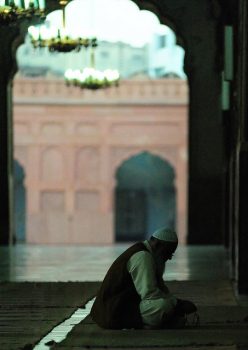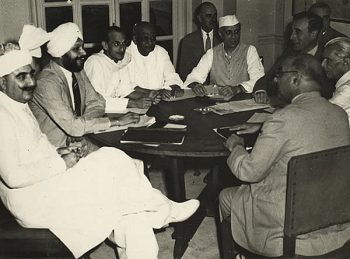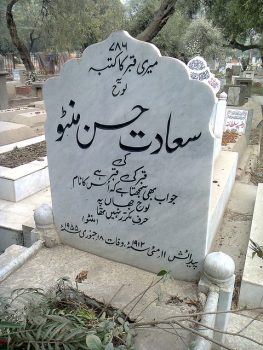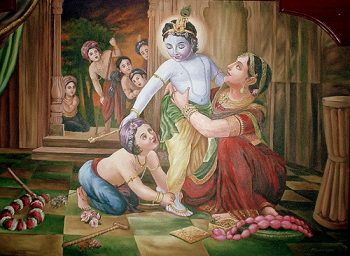Upendranath Ashk: Rebel, Misfit, Iconoclast (Part 2) Posted by Rachael on Aug 28, 2017 in Hindi Language, Uncategorized
Welcome back to my blog series on the infamous, acerbic satirist Upendranath Ashk! In this part 2 of the blog series (you can read part 1 here), we will delve into a bit more of Ashk’s background before continuing where we left off with his short story, “Daaliye/दालिये” (“The Daal Eaters”). For those who were wondering about the title, “daaliye” appears to be a term that Ashk coined himself to refer to “daal khaanevaale/दाल खानेवाले” (“daal eaters”) or those who live extremely cheaply (that is, consume “daal” as their primary foodstuff, which is known to be a cheap and plain dish) even while on vacation, a middle to upper class activity that, at least theoretically, requires more spending.
Last time, we left off with Ashk in college, publishing his first collection of short stories entitled, Nau Ratan/नौ रतन (Nine Jewels). It was during this phase of his life, also, that he adopted the nom de plume or takhallus “Ashk,” which means teardrop in Urdu, to honor the demise of a dear friend. Once he graduated from college in 1931, Ashk began teaching here for a few months (this was actually a quite common occurrence at the time, though it sounds odd to us today) before departing to Lahore with his friend Mela Ram “Wafa,” a poet and journalist. In Lahore, Ashk worked in the journalism world as a reporter for Lala Lajpat Rai’s (a major figure in the Indian Independence movement) newspaper Vande Mataram and climbed the ladder at the daily paper Veer Bharat and the weekly Bhoonchal as a translator and assistant editor. In 1932, Ashk married his first wife, Sheela Devi; that same year, partially on the advice of his mentor Munshi Premchand, Ashk switched to writing in Hindi, although he would continue writing in Urdu until his death. In fact, Ashk published another short story collection around this time, entitled Aurat ki Fitrat/औरत की फ़ितरत (this title has several possible meanings, including: The Nature of Woman or Womanly Wiles), to which Munshi Premchand composed the preface. In terms of Ashk’s devotion to Urdu, his first love, over Hindi, even after his “switch,” Ashk continued to write his stories and poems first in Urdu and then painstakingly translate and transliterate them into Hindi.
In 1934, troubled by his lack of financial stability as a journalist and writer, Ashk made the decision to go into law; he studied assiduously and eventually became a sub-judge. Unfortunately, just as he completed his law degree, he was dealt a blow in the form of his wife’s death from tuberculosis. It was at this juncture, no doubt inspired by the tragic event that had befallen him, that Ashk determined once and for all that he would become a full-time writer in the mode of “Progressive” (प्रगतिवाद/Pragativaad) writers of the time, a movement that stressed literary realism and a heightened awareness of societal ills. It was with this wholehearted commitment to writing realistically of suffering that he published a short story entitled “Daanchi/डाँची” (a word of Punjabi origin that refers to a female camel about to or having already given birth to her first calf) in 1936, which is still considered one of the major contributions to the Progressive Movement in Hindi-Urdu literature.
Later, in 1941, Ashk moved to Bombay to work for All-India Radio as a playwright and Hindi advisor. While there, he worked with many of his famous literary colleagues, one of the most renowned being the Urdu writer Saadat Hasan Manto; the two were “frenemies” in the truest sense of the word, and later Ashk would be inspired by their strange relationship to writer a memoir about his experiences with Manto entitled Manto: Mera Dushman/मंटो: मेरा दुश्मन (Manto: My Enemy). During this time, he started writing his semi-autobiographical, monumental novel Girti Divare/गिरती दीवारें (Falling Walls), which has been thoughtfully and skillfully translated into English by the Ashk scholar Daisy Rockwell; she has also translated a collection of Ashk’s short stories called Hats and Doctors and has written a critical biography on the author. This same year, Ashk ended his short-lived second marriage and hastily married a fan and budding writer with whom he had been corresponding for some time, Kaushalya Devi. He would remain married to her for the rest of his life. The two would go on to work together on a few literary projects, the most notable perhaps being Kaushalya’s tribute to Ashk on his 51st birthday filled with memoirs of her husband, Ek Rangeen Vyaktitva/एक रंगीन व्यक्तित्व (A Colorful Personality) and the jointly-written novel Do Dhara/दो धारा (Two Streams).
And now, let’s continue with part 2 of Ashk’s short story, “Daaliye/दालिए” (“The Daal Eaters”):
“कहिए भाई साहब, कैसा लगा आपको पहलगाँव?”
मिसेज़ चोपड़ा पीछे-पीछे आ रही थीं । उन साहब के जाते ही आगे बढ़ आयीं । मैंने उन्हें नमस्कार किया और कहा, “मैं तो अभी आया हूँ, आपको कैसा लगा, कहाँ कहाँ हो आयीं ?”
दस बरस की बच्ची फुदककर आगे आ गयी और उसने मेरी अँगुली पकड़ ली । मैंने उसके गाल पर चुटकी भरी और प्यार करते हुए पूछा, “कहो मुन्नी, कहाँ कहाँ घूमीं श्रीनगर में?”
लड़की लज्जा से, दोहरी हो गयी ।
“घूमते कहाँ, भल्ला साहब ने जान आफ़त में कर दी ।”
“अरे, कहाँ हैं गोप साहब, वे नहीं आये पहलगाँव?”
“आये थे, दो दिन रहकर चले गये ।”
Chopra Sahab asked, “So, Bhai Sahab, how do you find Pehelgav?”
Mrs. Chopra was walking behind him (Chopra Sahab). As soon as that gentleman left, she stepped forward. I greeted her and said, “I’ve only just arrived. How do you find it––where have you visited?”
A ten-year-old girl skipped forward and caught onto my finger. I pinched her cheek and asked affectionately, “Tell me, little one, where have you been wandering in Srinagar?”
But the girl only bowed her head in shyness.
“Where could we go? Bhalla Sahab has made our lives miserable.” Mrs. Chopra said.
“Oh, where is Gop Sahab––he didn’t come to Pehelgav?”
“He did come, and left after two days.”
भल्ला साहब के जिक्र से मेरे सामने पठानकोट से श्रीनगर तक बस का सफ़र, बस के साथी और उनमें सब से ज़्यादा भल्ला साहब की भारी-भरकम देह, उनकी बीवी, उनकी साली और उनके बच्चों की शक्लें घूम गयीं ।
बस में पहली, दूसरी और तीसरी सीट पर मेरा बच्चा, मेरी बीवी और मैं बैठा था । हमारे बराबर चोपड़ा साहब और उनकी बीवी थीं । चोपड़ा साहब के पीछे भल्ला साहब और उनकी बीवी, दोनों एक एक बच्ची को गोद में लिए बैठे थे, हमारे पीछे भल्ला साहब की साली और चोपड़ा साहब की यही बच्ची बैठी थी । भल्ला साहब के पीछे दिल्ली के एक व्यापारी अपनी भतीजी के साथ विराजमान थे, जिसे हमने भ्रमवश बुढ़ापे में ब्याही उनकी पत्नी समझा था । बस में दूसरे भी लोग थे, पर यही सवारियाँ थीं, जिन्होंने हमारा ध्यान खींचा और जिनसे बाद में मेल-मुलाकात हुई । इनमें भी भल्ला साहब सब से अहम थे ।
At the mention of Bhalla Sahab, the bus trip from Pathankot to Srinagar, the companions on the bus and, amongst them, especially Bhalla Sahab’s ponderous body and his wife’s, his sister-in-law’s and his children’s faces swam before my eyes.
On the bus, my son, my wife and I were seated on the first, second and third seats. Across from us were Chopra Sahab and his wife. Behind Chopra Sahab were Bhalla Sahab and his wife, who were each seated with a little girl on their laps. Behind us, Bhalla Sahab’s sister-in-law and Chopra Sahab’s daughter were seated. Behind Bhalla Sahab, a businessman from Delhi and his niece, whom we mistook for his much younger wife, were ensconced. There were also other people on the bus, but these were the travelers who caught our attention and with whom we became familiar later. Amongst these, Bhalla Sahab was the most important.
उनकी और शायद हमारा ध्यान कभी न जाता, यदि उनकी साली हमारे पीछे न बैठी होतीं, उनकी बच्चियाँ अपनी ममी और डैडी को छोड़कर अपनी आण्टी के पास न आ जातीं, मेरी आँखों में ज़बरदस्त गनोदगी न छायी होती और भल्ला साहब की बच्चियाँ लता मंगेशकर के पद-चिह्नों पर चलते हुए एक-दूसरे को मात देने पर न तुली होतीं ।
उनमें से एक की उमर चार और दूसरी की पाँच-छः बरस की ती, लेकिन भल्ला साहब ने उनके लिये कोई टिकट न लिया था । और दोनों मियाँ-बीवी उन्हें गोद में बैठाये थे । मेरी सीटें रिज़र्व थीं । दो दिन पठानकोट ही में एक मित्र ने रोक लिया था । सामान आदि उनके नौकर तुला-रखा गये थे । नाश्ते में देर हो गयी, बस चलने के पाँच मिनट पहले हम पहुँचे । जब बस चली और मैंने भल्ला साहब को कष्ट से बैठे देखा तो मैंने परामर्श दिया कि वे एक बच्ची को मेरे लड़के के साथ अगली सीट पर बैठा दें और दूसरी को मेरी पिछली सीट पर उसकी अपनी मौसी के पास बैठा दें । चोपड़ा साहब ने भी ऊपरी मन से कहा, “हाँ हाँ, मेरी बच्ची बैठी है, उसके साथ एक को बैठा दीजिये!” लेकिन भल्ला साहब ने सिर हिलाया—“नहीं जी, ये किसी और के पास बैठती ही नहीं, हमारे साथ ही चिमटी रहती हैं ।” बे बोले और यह कहते हुए उन्होंने एक बार कण्डक्टर की ओर देखा…लेकिन बस अभी थोड़ी ही दूर चली होगी कि दोनों मेरी गर्दन के पीछे अपनी आण्टी के पास आ गयीं । उनकी यह आण्टी यानी भल्ला साहब की साली कहने को बी.ए. थीं, लेकिन आवाज़ या पहरावे, किसी से भी उस बात का सबूत न मिलता था । उनके स्वर में कुछ अजीब-सी अनगढ़ सानुनासिकता थी ।
Perhaps we would not have noticed them had Bhalla Sahab’s sister-in-law not been seated behind us, had his little girls not left their Mummy and Daddy to sit beside their aunt, an overwhelming lassitude hadn’t cast a pall over my eyes and Bhalla Sahab’s little girls had not been bent on outdoing each other in their attempts to walk in Lata Mangeshkar’s footsteps.
One of the girls was four and the other was five or six: they were of age, but Bhalla Sahab hadn’t gotten a ticket for them. And both husband and wife had seated them in their laps. My seats, however, were reserved. A friend had detained me for two days in Pathankot. His servant had gone to stow our luggage and other belongings in the bus. So, our breakfast was delayed, and we arrived five minutes before the bus left. When the bus left and I saw Bhalla Sahab seated uncomfortably, I advised him to put one of the girls on the seat next to my boy and the other on the seat behind me next to her aunt. Chopra Sahab also said halfheartedly, “Yes, yes, my little girl is seated; please seat one of them with her!” But Bhalla Sahab shook his head—
“No, sir, these two aren’t about to sit next to anyone else; they’re glued to us.” While saying this, he cast a glance at the conductor…But the bus must have gone a bit farther by that time because both of the girls had gone to sit beside their aunty right behind me. This aunty or Bhalla Sahab’s sister-in-law supposedly had a B.A., but there was no evidence of this from her voice, clothing or anything else for that matter. Her voice had a rather strange, crude nasality.
हमारी पीठ के पीछे वे लगातार कुछ-न-कुछ प्रवचन देती जा रही थीं । फिर जो बात मुझे बुरी लगती, वह यह थी कि जब खिड़की में धूप आ जाती तो वे चोपड़ा साहब की बच्ची को खिड़की में कर देतीं और स्वयं उसकी जगह हो जातीं और जब जब पहाड़ की ओट के कारण छाया हो जाती तो उसे हटाकर फिर खिड़की में हो बैठतीं और रास्ते के बदलते नज़ारों, सड़क के दिलचस्प मोड़ों, उभरती चोटियों और बहती नदियों पर लगातार “रंनिग कमेण्ट्री” देती जातीं । हालाँकि पठानकोटी मित्र ने हमारे आाराम के लिये कोई कोर-कसर न उठा रखी थी, लेकिन कुछ परायी जगह और कुछ गर्मी के कारण मुझे नींद न आयी थी । आँखें बेतरह बंद हुई जा रही थी, लेकिन वे देवी जी थीं कि उनकी कमेण्ट्री बन्द ही न होती थी । तभी बल्ला साहब की बच्चियाँ भी उनके पास आ गयीं । लेकिन उनमें से किसी को अपने पास बैठा-कर अपनी जगह तंग करने के बदले उन्होंने एक को खिड़की के साथ खड़ा कर दिया और दूसरी को मेरे पीछे खड़ा कर दिया कि सामने से बाहर का नज़ारा देख सके ।
Behind us, she held forth continuously on something or other. What I really disliked about her was that when the sun came in through the bus window, she would put Chopra Sahab’s little girl next to the window and she herself would assume the girl’s place. And, whenever there was shade due to the mountain, she would move the little girl and sit near the window. And all the while she gave a continuous running commentary on the changing views, the interesting bends in the road, the rising peaks and the flowing rivers. Even though our Pathankothi friend had spared no expense in ensuring our comfort, I wasn’t able to sleep partly due to being in a strange place and partly due to the heat. My eyes kept closing anyway, but that lady was not about to stop her commentary. It was then that Bhalla Sahab’s little girls came to sit beside her. But, instead of making herself uncomfortable, she took one of the girls and stood her up next to the window and stood the other up behind me so that she could have a clear view through the front of the bus.
क्षण भर तो वे कन्याएँ चुपचाप बाहर देखती रहीं, फिर अचानक उनमें से एक बड़े भोंडे, मोटे स्वर में गाने लगी:
“तू मेरा चाँद, मैं तेरी चाँदनी ।”
और दूसरी ने बाहर देखते देखते तुतली आवाज़ में लुकमा दिया:
“नहीं दिल का लगाना कोई दिल्लगी, कोई दिल्लगी ।”
कुछ देर दोनों यही गाती रहीं, फिर अचानक पहली चिल्लायी (लेकिन गाते हुए) “वह छोटी मोटर आती है…वह छोटी मोटर आती है…।”
मैं एक बार जागा, चाहा कि लड़की के सिर पर एक चपत दूँ, पर मोटर शायद किसी मोड़ में ओझल हो गयी और लड़की चुप हो गयी । मैं ऊँघ गया ।
लेकिन तब शायद दूसरी को कहीं सड़क कूटने वाला इंजन चलता दिखायी दे गया और वह गाने लगी —“वह मोटा इंजिन चलता है…वह मोटा इंजन चलता है…वह मोटा इंजन चलता है…”
और शायद मोड़ पर मोटर भी निकल आयी और छोटी लड़की ताली बजाने लगी —“वह छोटी मोटर आती है…वह छोटी मोटर आती है…वह…”
और मेरे नीम-गनोदा कानों में कुछ ऐसे सुनायी दिया—“वह छोटी मोटर आती है…वह मोटा इंजिन चलता है…वह छोटी मोटर आती है…वह मोटा इंजन चलता है…।” झुँझलाकर मैं उठा और मैंने धीमी आवाज़ में कड़ककर कहा, “चुप रहो!” और फिर मैंने सोने की कोशिश की ।
लड़कियाँ चुप हो गयीं या शायद मोड़ के कारण मोटर और इंजन ओझल हो गये, लेकिन कुछ देर बाद मुझे सोया जानकर दोनों फिर चिल्लाने लगीं:
“न ये चाँद होगा न तारे रहेंगे,
मगर हम हमेशा तुम्हारे रहेंगे ।”
For a moment, these “maidens” silently looked out the window; then, suddenly, one of them began singing in a very rough, crude voice:
“You are my moon, I am your moonlight.”
And, while looking outside, the other interrupted in a lisping voice:
“Do not play tricks with my heart, do not play tricks with my heart…”
For a while, both of them kept singing this song. Then, suddenly, the first one screamed (but, while singing), “Here comes a little car…here comes a little car…”
I woke up at once; if only I could give that girl a good thump on the head. But the car perhaps disappeared in some bend in the road and the girl became quiet. I dozed off.
But then, perhaps, the other saw a steamroller somewhere and began singing, “There goes a big truck…there goes a big truck…there goes a big truck.”
And perhaps the car emerged from the bend in the road and the younger girl began clapping her hands, “Here comes a little car…here comes a little car…here…”
And, in my half-sleeping state, I heard something like this, “Here comes a little car…there goes a big truck…here comes a little car…there goes a big truck…” Enraged, I woke up and, in a low voice, I growled, “Be quiet!” And I attempted to sleep once more.
The girls became quiet; perhaps the car and the truck had disappeared in a bend in the road. But, a little while later, I heard them both start screaming as I slept:
“Neither the moon nor the stars may remain,
But I will always remain yours.”
आख़िर मैं उठा, मुँह पर हाथ फेरकर मुड़ा और मैंने भल्ला साहब से कहा, “आपकी लड़कियाँ खूब गाती हैं साहब! इन्हें किसी ऐसे स्कूल में भरती कराइए, जहाँ इनकी प्रतिभा को उचित विकास का अवसर मिले ।”
भल्ला साहब ने मेरी ओर देखा और बोले, “मेरा अपना यही ख़याल है, लेकिन अभी तो ये पड़ोस के सिनेमा ही से शिक्षा पाती हैं ।”
उनकी यह बात सुनकर चोपड़ा साहब ने ठहाका लगाया । मेरी तरह शायद वे भी सोने की कोशिश कर रहे थे और कनसुरी लड़कियाँ का भद्दा, कंर्कश स्वर उनकी नींद का झकझोर रहा था । हँसकर और पीछे मुड़कर भल्ला साहब की ओर देखते हुए उन्होंने कहा, “आप इन्हें ऑल इण्डिया रेडियो में बच्चों के प्रोग्राम में भेजिए ।”
At last, I woke up. Passing my hand over my face, I turned to Bhalla Sahab and said, “Your girls sing so much, sir! Get them admitted into a school where their brilliance may develop appropriately.”
Bhalla Sahab looked at me and said, “I had the same idea, but right now they get their education from the neighborhood cinema.”
Hearing this, Chopra Sahab let out a guffaw. Perhaps, like me, he had been trying to sleep and the girls’ earsplitting, coarse, harsh voices had jostled him from his sleep. Laughing, he turned back to look at Bhalla Sahab and said, “Send them to All India Radio’s children’s program.”
अबकी साली महोदया बोलीं, “रेडियो के प्रोग्राम-असिस्टेण्ट तो हमारे नज़दीक ही रहते हैं । लड़कियाँ दिन भर गाती रहती हैं । इनका गाना सुनकर उन्होंने कहा कि ये रेडियो की बड़ी अच्छी आर्टिस्ट सिद्ध होंगी, पर जीजा जी मानते ही नहीं ।”
इस पर जीजा जी अपने मोटे, पंजाबी कुलचे जैसे गोल गुलगोथने मुझ से मुस्कराते हुए बोले, “हमारा घर ज़रा रेडियो से दूर पड़ता है, एक हिलमैन ले लें तो भेजा करेंगे ।” और उन्होंने प्यार से छोटी लड़की को खींचकर अपनी गोद में ले लिया और बोले, “सुनाओ न बेटी वह गाना−−“
“दूर कोई गाये, धुन यह सुनाये—
तेरे बिन छलिया हो, बाजे न मुरलिया हो ।”
और बेटी प्रसन्न और प्रोत्साहित होकर चिंघाड़ने लगी ।
मैंने सिर पीट लिया । सोने का खयाल एकदम छोड़कर मैं बाहर के बदलते दृशयों को देखने लगा ।
At this point, madam sister-in-law spoke, “The radio’s program assistant lives right near us. The girls sing all day. He heard their singing and said that they’ll become great radio stars, but my brother-in-law doesn’t believe it.”
At this, her brother-in-law, smiling with his fat, plump-cheeked face that looked like a Punjabi kulcha, said to me, “Our house is a bit far from the radio station; give us a Hillman and we’ll send them.” And he lovingly pulled the younger daughter onto his lap and said, “Won’t you sing that song sweetie—”
“Someone sings from afar, singing this melody—
Without you there is no trickster, no one to play the flute.”
And the daughter, pleased and encouraged, began to trumpet the song.
I beat my head (against the seat). I completely abandoned the idea of sleep and began to look at the changing views outside.

Build vocabulary, practice pronunciation, and more with Transparent Language Online. Available anytime, anywhere, on any device.









